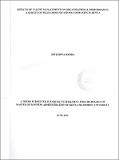Effects of Talents Management on Organizational Performance. A Survey of Telecommunication Companies in Kenya

View/
Date
2013-06Author
Mwendwa, Sophia
Type
ThesisLanguage
enMetadata
Show full item recordAbstract
Talent management practice within an organization is a strategy that seeks to identify, develop, deploy and retain talented and high potential employee. In today's global economy, companies must continually invest in human Capital. Yet the skills shortage presents both social-economic and cultural challenges as talent crosses borders. Thus, in view of workforce trends such as shifting demographics, global supply chains, the ageing workforce and increasing global mobility, forward looking organizations must rethink their approach to talent management to best harness talent. Although Talent management practices are applied by . companies in Kenya, they can only contribute optimally to business performance if both top management and employees are aligned on its objectives and implementation in the organization. Using a combination of qualitative and quantitative approaches, the study examined the extent of the alignment of talent management to the organizations business strategy and the influence this had on organizational performance. The study was carried out among telecommunication companies in Kenya. The study adopted a descriptive research design. Stratified random sampling was used to select the population from which a sample of 60 respondents was drawn. Data was collected mainly by use of questionnaires that was coded to enable the responses to be grouped into various categories. The researcher then used descriptive statistics to analyze data. These include percentages, mean and standard deviation. SPSS and Microsoft excel software was used to generate the statistical outputs. The Pearson's correlation of significance was used to test the hypothesis. The researcher found that workforce planning; talent acquisition, talent development, performance management and succession planning have a positive effect on organization performance and that organizations that have employed best talent management practices performed better than those that did not. The study concludes based on the research finding, that Talent Management is a very key function in every organization. The study recommends that since workforce planning, talent acquisition, talent development, performance management and succession planning have a positive effect on organization performance, mechanisms should be put in place to align the talent management practices with the strategic goals of the organization to proper the organization to greater performance.
Publisher
KeMU
Description
HF 5549.5.S6 2013
